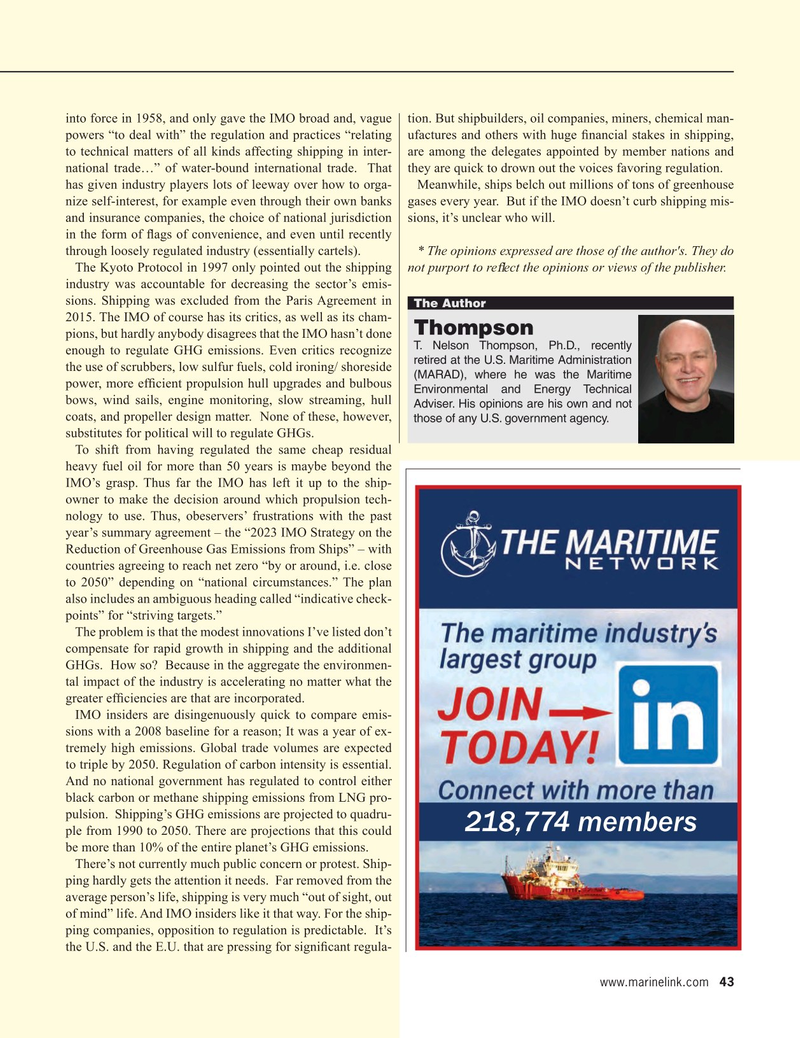
Page 43: of Maritime Reporter Magazine (December 2023)
Great Ships of 2023
Read this page in Pdf, Flash or Html5 edition of December 2023 Maritime Reporter Magazine
into force in 1958, and only gave the IMO broad and, vague tion. But shipbuilders, oil companies, miners, chemical man- powers “to deal with” the regulation and practices “relating ufactures and others with huge ? nancial stakes in shipping, to technical matters of all kinds affecting shipping in inter- are among the delegates appointed by member nations and national trade…” of water-bound international trade. That they are quick to drown out the voices favoring regulation.
has given industry players lots of leeway over how to orga- Meanwhile, ships belch out millions of tons of greenhouse nize self-interest, for example even through their own banks gases every year. But if the IMO doesn’t curb shipping mis- and insurance companies, the choice of national jurisdiction sions, it’s unclear who will. in the form of ? ags of convenience, and even until recently through loosely regulated industry (essentially cartels). * The opinions expressed are those of the author's. They do
The Kyoto Protocol in 1997 only pointed out the shipping not purport to re? ect the opinions or views of the publisher.
industry was accountable for decreasing the sector’s emis- sions. Shipping was excluded from the Paris Agreement in
The Author 2015. The IMO of course has its critics, as well as its cham-
Thompson pions, but hardly anybody disagrees that the IMO hasn’t done
T. Nelson Thompson, Ph.D., recently enough to regulate GHG emissions. Even critics recognize retired at the U.S. Maritime Administration the use of scrubbers, low sulfur fuels, cold ironing/ shoreside (MARAD), where he was the Maritime power, more ef? cient propulsion hull upgrades and bulbous
Environmental and Energy Technical bows, wind sails, engine monitoring, slow streaming, hull
Adviser. His opinions are his own and not coats, and propeller design matter. None of these, however, those of any U.S. government agency.
substitutes for political will to regulate GHGs.
To shift from having regulated the same cheap residual heavy fuel oil for more than 50 years is maybe beyond the
IMO’s grasp. Thus far the IMO has left it up to the ship- owner to make the decision around which propulsion tech- nology to use. Thus, obeservers’ frustrations with the past year’s summary agreement – the “2023 IMO Strategy on the
Reduction of Greenhouse Gas Emissions from Ships” – with countries agreeing to reach net zero “by or around, i.e. close to 2050” depending on “national circumstances.” The plan also includes an ambiguous heading called “indicative check- points” for “striving targets.”
The problem is that the modest innovations I’ve listed don’t compensate for rapid growth in shipping and the additional
GHGs. How so? Because in the aggregate the environmen- tal impact of the industry is accelerating no matter what the greater ef? ciencies are that are incorporated.
IMO insiders are disingenuously quick to compare emis- sions with a 2008 baseline for a reason; It was a year of ex- tremely high emissions. Global trade volumes are expected to triple by 2050. Regulation of carbon intensity is essential.
And no national government has regulated to control either black carbon or methane shipping emissions from LNG pro- pulsion. Shipping’s GHG emissions are projected to quadru- 218,774 members ple from 1990 to 2050. There are projections that this could be more than 10% of the entire planet’s GHG emissions.
There’s not currently much public concern or protest. Ship- ping hardly gets the attention it needs. Far removed from the average person’s life, shipping is very much “out of sight, out of mind” life. And IMO insiders like it that way. For the ship- ping companies, opposition to regulation is predictable. It’s the U.S. and the E.U. that are pressing for signi? cant regula- www.marinelink.com 43
MR #12 (34-44).indd 43 12/6/2023 2:47:01 PM

 42
42

 44
44
